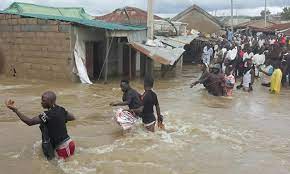Save the Children International, SCI, Nigeria, has called for improved humanitarian assistance for children affected by the devastating flood in Maiduguri.
The Country Director, SCI, Nigeria, Duncan Harvey, during a news conference in Abuja, said there were more than 150,000 children in 26 camps, and many have been disconnected from their families.
Harvey, while speaking on his visit along with his team to see the situation of things in Maiduguri and offer humanitarian assistance, said the disaster was the worst in living memory in 30 years.
“Last week’s flooding in Borno is one of the worst in 30 years, affecting 400,000 people and leaving children and families without shelter, healthcare, school, clean water and food.
“I was in Maiduguri until Saturday when I saw the massive damages that the flood caused and interacted with some affected families.
“Conditions in the hastily opened Internally Displaced Persons, IDP, camps are overcrowded and in sanitary, and the scale of partners’ services is not keeping up with the numbers.
“According to the Borno State Government’s Emergency Operations Centre, over 300,000 people have been registered in at least 26 relocation sites, as of September 14.”
Harvey noted that up to 30 sites have been set up and registration is ongoing, adding that access to hospitals, markets and other critical infrastructure remained limited.
“Our immediate concern is the short-term need for food, water and shelter, especially for children and their families.
“Additionally, we are supporting children who have been separated from their families.
“Our child protection team is working hard to reunite them with their families, while providing appropriate care in the meantime.
“We are particularly concerned because this disaster occurred during the lean season, when malnutrition is already at its peak.
“Many children were already malnourished before the flood and now face even more severe challenges living in these camps,’’ he said
Harvey said the state government had shown impressive leadership in response efforts, and the coordination on ground had been commendable.
He, however, said the conditions for children were dire and there is an urgent need for more resources and stronger coordination to scale up life-saving interventions.
“We have about 200 staff working on the ground, collaborating with the Borno State government, United Nations and other international NGOs to respond as effectively as possible.
“I will be meeting with the humanitarian country team and we will be working to coordinate our resources to save as many lives as we can, with a particular focus on children.
“So we can estimate that 150,000 of those people living in those camps are children, and that is a real cause for concern.
“We will continue to protect those children in terms of health and nutrition.
“We will ensure they have access to safe drinking water and appropriate care in place.”
Harvey said children would be placed on therapeutic feeding to boost their nutritional needs.
“In one of the camps we are extending our therapeutic feeding programmes for underweight children, so we have an active screening programme, where we try to identify children who are malnourished and underweight.
“We are working together with the Ministry of Health to identify those children and put them on therapeutic feeding programmes and also make sure they can recover as soon as possible.
“We are very concerned to scale up that programme.”
He noted that food rations have been distributed to 5,000 people as a way of scaling it up over the last few days.
He said SCI was working with local vendors to provide prepackaged meals within the camps as key area of intervention for SCI.
He added that SCI was also providing safe drinking water to children and other people in the camps.(NAN)





